Report of RTD on The Dilemma of Myanmar's Stateless Rohingyas
|
MUSLIM Institute organized a round table discussion titled “The Dilemma of Myanmar’s Stateless Rohingyas”, on Tuesday June 02, 2015 at National Library of Pakistan, Islamabad. Chairman, Institute of Strategic Studies Islamabad Ambassador (R) Khalid Mehmood, Chairman MUSLIM Institute Sahibzada Sultan Ahmad Ali, Former Ambassador of Pakistan to Myanmar Mr. Amjad Majeed Abbasi, Member Grand Assembly of Republic of Turkey Mr. Burhan Kayaturko (via video link) and Research Associate of MUSLIM Institute Mr. Usman Hasan shared their views on the occasion. Public Relations Coordinator of MUSLIM Institute Mr. Tahir Mehmood moderated the proceedings of the discussion. Representatives of different think tanks, foreign delegates, scholars, university students and professors, journalists and analysts participated in the RTD.
|
|
|
|
Salient points discussed by speakers are as below:
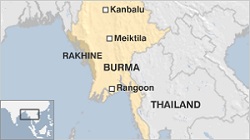 |
Rohingya community is facing life threatening challenges since long and it is our moral obligation to focus on the possible resolutions of their problems. This particular issue is a source of mounting tension among Muslims and therefore needs to be addressed urgently. The issue was initially highlighted by social media and then international media started to give it coverage. Myanmar’s state of Rakhine (Arakan) has a very odd geo strategic location in Bay of Bengal. Muslim Arab traders came to the region in the 8th century thus initiating the spread of Islam. Later, people belonging to various ethnicities came to the region which included Bengalis, Turks, Pathans and others. ‘Rohingya’ were developed from different stocks of people concentrated in one geographical location i.e. in state of Rakhine. Today there are more than 1.2 million Rohingyas who belong to Rakhine.
In the decade of 1970s, during military rule in Myanmar, Rohingyas were treated as foreigners and gradually their nationality was taken away. During that era ethnic clashes between Rakhine Buddhists and Rohingya Muslims were spread and as a result of suppression more than 200,000 Rohingyas fled to Bangladesh. In 1982, a controversial citizenship law was passed by Myanmar government according to which, Rohingyas lost the Myanmar’s citizenship since they were unable to prove their presence and settlement in the country before 1823. In 1990s there was again violence against Rohingyas and resulting in a mass exodus. Only after pressure from international community, there was repatriation; but those who returned faced miserable times; their properties and houses were burnt. The repatriation was followed by mass exodus once again and Rohingyas’ fate remained unknown. Muslims in whole of Myanmar face persecution but the Rohingya community is carrying the heaviest burden. Denial of their citizenship by Myanmar is the root cause of all the issues faced by them today.
|
|
|
|
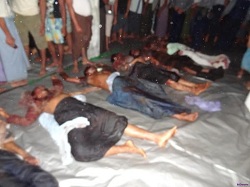 |
Recently in 2012, severe violence erupted against Rohingyas by Rakhine Buddhists, backed by state institutions and then the issue was exploited. Buddhists mobs attacked Muslim Rohingyas, the presence of paramilitary forces was that of mere bystanders since they didn’t stop the mob from executing Muslims and burning and looting their properties. Thus the state and its law implementing institutions carry equal responsibility of persecution of Rohingyas. According to UN figures, more than 140,000 people were displaced from their homes, many brutally killed, injured women raped, many orphaned and many houses were burnt. These people are not allowed to return to their homes and are confronted with extremely miserable conditions in refugee camps. In 2014 Myanmar census, held after 30 years, Rohingya community was not only ignored but was denied acceptance as an ethnic group belonging to Myanmar. Myanmar government took stance that all of them are actually Bengali migrants. Due to this denial of citizenship, Rohingyas are denied from basic human rights e.g. security, education, jobs, health facilities, social and political rights, free movement, the Rohingyas have to take official permission before marriage, cannot own land or buy property in Myanmar etc.
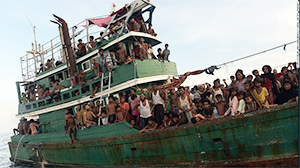 |
Since 2012, 120,000 Rohingyas have boarded ships to flee from Myanmar. Many of them were forcibly put on ships and were forced to leave Myanmar. Majority of them are moving towards other Southeast Asian countries like Thailand, Malaysia, Indonesia and Bangladesh as well and seeking asylum but so far they have not been allowed entry in those countries as these countries maintain plea that they are Myanmar’s citizens and should be given Myanmar’s citizenship. Indonesia and Malaysia have agreed temporarily to accept some of them for one year as long as the international community agrees to resettle them within one year. Thousands of people are stranded in boats and are in real danger; UN has warned that this could turn into a massive humanitarian crisis.
We urge that as short term solution, all Southeast Asian countries should give asylum to the refugees but as a long term solution, the international and regional communities and forums, various human rights organizations, should actively and diplomatically intervene to push Myanmar not only to grant citizenship to the Rohingyas, but also ensure their safe return and guarantee provision of basic human rights.
|
|
|
|
According to Human Rights Watch many Rohingyas are fleeing for their life from Myanmar, through human traffickers; some being expelled forcibly. International Organization for Migration reported that about 25,000 Southeast Asian migrants took to the seas in the first three months of 2015. Many of these boats people are stranded in open sea seeking asylum in nearby countries and the boats are overcrowded and overloaded, with a severe shortage of food, water and no health facilities. Undoubtedly the Rohingya Muslims are facing the risk of imminent death. There have been reports of boats capsizing, boats being abandoned, and unaccountable deaths. Unfortunately, sea is the only option for escape left for the Rohingyas, since after crackdown by Thai government against human traffickers in bordering forests. There are also mass graves found in Malaysia and Thailand which are believed to contain bodies of Rohingya people being smuggled by human traffickers.
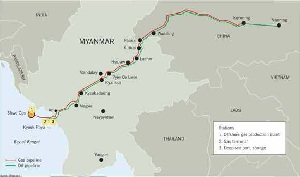 |
The Rakhine state of Myanmar has been under international focus for its geo-strategic importance; 1. the Bay of Bengal being part of critical trade routes, 2. an energy corridor, oil & gas, passing through Rakhine. Due to these lucrative strategic interests, business and investment opportunities, world powers are treading carefully in order not to offend the Myanmar government. A few diplomatic statements can be heard from the foreign offices of some powerful countries; but the majority have just turned a blind eye to the plight of Rohingya people in Rakhine. This has further emboldened the local regime to give a silent nod to the local extremists persecuting the Rohingya community.
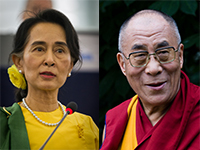 |
While the International media is focusing on the Rohingyas abandoned and stranded in boats at sea; the root causes go unaddressed. And since the root causes are not being addressed, the issue is being compounded with resulting in worse situation with death counts. Neither Myanmar’s opposition leader and Noble Peace Laureate, Aung San Suu Kyi nor the ruling party talked about Rohingyas’ persecution; in fear of losing their vote banks in upcoming elections. Other Noble Laureates in the world have criticized Aung San Suu Kyi for not working to stop persecution of Rohingya community. The Dalai Lama has stated, "It's very sad. In the Burmese case I hope Aung San Suu Kyi, as a Nobel laureate, can do something”. But she stopped short in calling the Buddhist monks to cease their atrocities.
Plight of Rohingyas defiles all international norms and laws. It is against Universal Declaration of Human Rights and conventions of human rights. According to conventions of child, every child will have nationality where ever he is born but this right is not being provided to Rohingyas. Right to protect own citizens of a state is also being violated. According to R2P (right to protect) doctrine, international community has to intervene if state is not protecting rights of its own people and based on this convention, Libya was intervened; unfortunately in Myanmar, it is not being practiced. Rohingyas are being engaged in forced labor in government projects which is also in violation of international labor law.
|
|
|
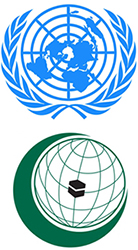 |
According to the reports of UN, the Rohingyas are one of the most prosecuted minorities in the world. UN General Assembly has stated, what is happening is not acceptable and Rohingyas should be given Myanmar nationality; thus morally strengthening the case of Rohingya. However, UN General Assembly has no power to enforce its decision and can only recommend. UN Security Council has power to enforce decisions but this year on May, 28th, UNSC was briefed over the issue for the first time and despite the strong case; UNSC just listened and has taken no action. Big powers have their own interests and thus they are not looking to take any action that could jeopardize their relations with the government of Myanmar.
OIC has appointed special envoy and a fact finding mission for Rohingyas and have also announced $200,000 for humanitarian aid. But OIC has not played any decisive role; this is not only for Rohingya but for all other issues confronted by Muslims world. Pakistan has also shown concerns and urged Myanmar government to bring stability in the Rakhine state.
As an immediate and urgent first step, the humanitarian plight of the Rohingyas must be focused upon; provision of live-able refuge, food, water, medicine, basic health facilities etc. As a Second, the international community should exert significant pressure to compel the Myanmar government to, not only grant citizenship, but to improve socio-economic condition of Rohingyas. Since basic remedy is the nationality of Myanmar, until and unless citizenship is not given, this issue will keep recurring. Unfortunately, the responsibility of the crisis stands with the Myanmar leadership; the president of Myanmar, himself stated officially that solution of problem is to expel all Rohingyas from Myanmar; and this speaks volumes of the intentions of the leadership. The 1982 citizenship act was passed by executive order and it can be changed, repealed if there is a political will of doing so.
 |
Of all the Muslim and non-Muslim countries; Turkey is the only nation that has come to the aid of Rohingyas stranded at sea. But this is not the job on just one country; every nation, who believes in Human Rights has the responsibility to initiate and participate in unified efforts to curb severe human crisis. It must be highlighted that this is no longer an ethnic or a religious issue; it has developed into a full scale humanitarian crisis.
|
|
|
During the interactive session speakers, panelists discussed and replied different questions asked by the participants. The speakers discussed that:-
Muslims came to Rakhine state a thousand years ago. When the British signed a treaty with the locals in 1830s, population of Rakhine was 60,000 which means people were living there already. Afterwards during British era, people from different regions settled in Rakhine as well. In May 2012, Myanmar started calling Rohingyas as Bengalis. Recent riots against Rohingyas are just to make sure that Muslims are pushed out of those areas and business should be taken by other communities.
Separating the communities is the major problem because bringing them back closer to one another is very difficult task once the hatred is spread. Bringing back displaced people is very difficult and we have to work for adjustment of migrants wherever they are at the moment and provide them with facilities.
Future of Rakhine is seen as an economic hub. Rakhine crisis is not in isolation, Muslims across the world in many areas are facing the turmoil. We have to see things in larger perspectives. We have to encourage governments to carry on good things like humanitarian aid by OIC. US president also gave statements to provide human rights to all people in Myanmar but big powers are having interests there as well. Positive steps should be encouraged so that forceful efforts are made and we can make difference somewhere. The issue is really important as refugees in boats are in terrible situation.
European powers are putting pressure on Myanmar for betterment of situation but it is not upto the mark as they have their own interests and don’t put enough pressure. Myanmar government will not understand anyone until world takes unified stance and imposes embargo and sanctions and forces Myanmar to take actions to stop the violence.
|
|
|
Salient recommendations extracted from speeches and discussions are as follows:-
|
| » |
International community should focus three step solution of the crisis i) short term; humanitarian assistance to the refugees especially to those stranded in the sea at war footing basis ii) medium term; the socio economic condition with emphasis on security, of Rohingyas should be improved iii) long term; the Rohingyas should be given citizenship of Myanmar by modifying 1982 citizenship act. |
| |
| » |
United Nations Security Council should show seriousness and commitment to their objectives, without bias and take immediate enforcement measures against Myanmar; as this crisis violates all international conventions on human rights. |
| |
| » |
South East Asian countries should immediately give assistance and asylum to the refugees stranded in the sea. Regional and international countries/organizations should assist the host countries in this regards. |
| |
| » |
Investigation should be made on mass graves found in Thailand and Malaysia in human traffickers’ camps and culprits should be dealt with a heavy hand as per international laws. |
| |
| » |
Myanmar government should take necessary actions to decrease racism and religious hatred among different segments of society to avoid riots in future. |
| |
| » |
Constructive discourse is needed among Muslims to solve their issues including the issue of Rohingya Muslims. OIC should play an effective and a decisive role in this regard. |
| |
| » |
Muslim leaders should respond on the Rohingya crisis and play their role to force Myanmar to provide basic human rights to all people. |
| |
| » |
International media should highlight the issue in order to raise public awareness and build international pressure so that governments should take action and force Myanmar government to treat Rohingyas as other citizens. |
|
|
|
Download pdf
Newsletter
Share
Releated Publications